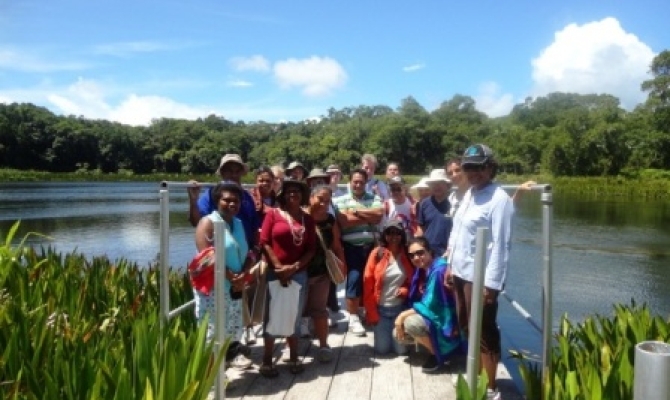
28 March 2011, Palau - Lake Ngardok Nature Reserve, a Ramsar site of wetland importance, was the site for a field visit during the Oceania Wetlands Meeting in Palau this week.
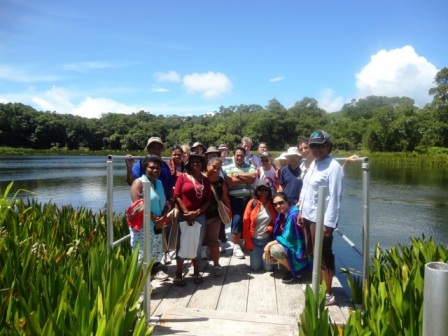 Lake Ngardok is a small, natural freshwater lake on Babeldaob Island with some swamp vegetation and is the largest permanent freshwater body in Palau. It supports indigenous fish and also has a small breeding population of the estuarine crocodile. The lake is particularly important to the small population of Melekeok State for control of floods and maintenance of water quality. Lake Ngardok also supports 11 indigenous birds including the national bird, the Palau Fruit Dove.
Lake Ngardok is a small, natural freshwater lake on Babeldaob Island with some swamp vegetation and is the largest permanent freshwater body in Palau. It supports indigenous fish and also has a small breeding population of the estuarine crocodile. The lake is particularly important to the small population of Melekeok State for control of floods and maintenance of water quality. Lake Ngardok also supports 11 indigenous birds including the national bird, the Palau Fruit Dove.
Below are some personal accounts of the meeting participants that visited the site for the first time:
Ms. Rose Singadan, Papua New Guinea
My first impression was Wow! This is a really beautiful place and needs to be protected for every citizen's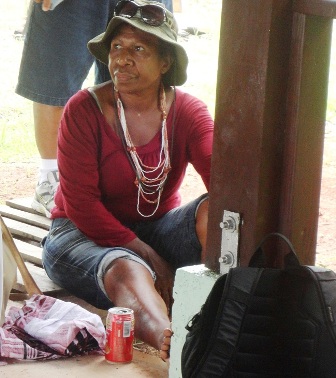 benefit.
benefit.
I was also impressed with the enthusiasm and the commitment put into this area by the managers and the commitment they have in doing what they have to do.
The place has a natural beauty with the lake in the middle of the rolling hills where one would think that there was nothing in there for protection. It's through the visit and the walk through the forests and open area that you get a feel of the different types of habitats within the conservation area. I am reminded of the efforts made by our colleagues in Palau to protect an area that can be enjoyed by all.
I really commend the efforts made by the Melekeok State Government and the Lake Ngardok Nature Reserve authorities to protect and manage such a site.
We have similar challenges and constraints but conservation and protection of nature and biodiversity always benefits both community livelihoods and sustainable development of any country.
After all we are using and enjoying what our ancestors left us before and therefore we also have a duty of care and responsibility to our next generation to pass on what we are using now to sustain our lives and our economies.
Rolenas Baereleo, Vanuatu
The trip to the Lake Ngardok was a great experience for me.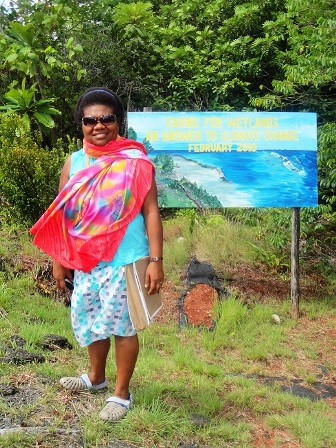 I have learned a lot from this trip, I noticed the efforts of the Ngardok stakeholders to cater for Eco-tourism at the site. It's also interesting to see how it is managed and the Government efforts and commitments to raise funds for the sustainability.
I have learned a lot from this trip, I noticed the efforts of the Ngardok stakeholders to cater for Eco-tourism at the site. It's also interesting to see how it is managed and the Government efforts and commitments to raise funds for the sustainability.
During the briefing before we entered, I was already scared of crocodiles and pacific boa snakes as they are present in the site, but being in a big group I trusted the tour guides and everyone in the group.
One interesting thing that I have observed is the nature of the vegetation, although it's at low elevation of 250m above sea level, the forest is almost similar to that of mountain forest vegetation back at home.
I sometimes think that we have struggle a lot with our rehabilitation programs back home, but seeing the experience at the Lake Ngardok rehabilitation program made me think that there is no need to complain but to keep on trying. It is impressive to see crocodiles in the lake which makes me scared but I enjoyed the trip.
I would say excellent job to the Site Managers of Lake Ngardok.
Thank you to the wonderful organizers of this trip for this great field trip.
Thank you
Seini Fotu, Tonga
On Wednesday the 28th of March we set off to visit the Lake Ngardok Nature Reserve Ramsar Site of Palau. It 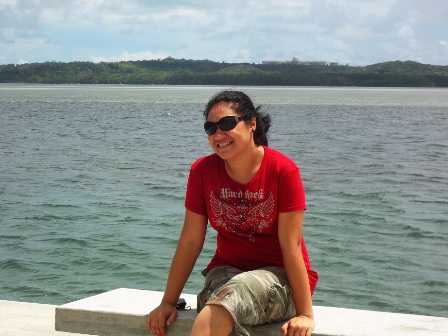 was a beautiful day and luckily it didn't rain, if it did it would have made the track more slippery for all of us!
was a beautiful day and luckily it didn't rain, if it did it would have made the track more slippery for all of us!
Before we started out on the track we were warned by the tour guide to be aware of the poisonous trees on the tracks. At first I was a little worried to touch any trees as we walked passed but luckily the tour guides showed us the particular poison trees so we were careful not to touch it on the way.
It was good to see native and endangered tress labeled on the track.
The walk to the Ngardok Nature Reserve was long but fun at the same time since we have been sitting in the conference for days, it was good to get out and exercise a little.
Although it was tiring, touring with a big group just made it exciting and fun as we joked and laughed on the way.
We reached the beautiful Lake Ngardok Nature Reserve and I have to say I was taken in by the beauty of the area and its natural layout.
It is a beautiful sight of nature with no disturbance from the villages.
We were able to get a glimpse of one crocodile on the lake but we were told it is of no danger, phew!
The journey back to the bus was exhausting but a great experience for us who spend more time indoor.
I have to say National Focal Points of Palau have done a good job and they are active in environmental conservation activities.
Good Job!
Ms. Taina Temakei, Kiribati
The trip to Palau first Ramsar site reminds me of visiting Mount Tomanivi, the highest mountain in Fiji, when I 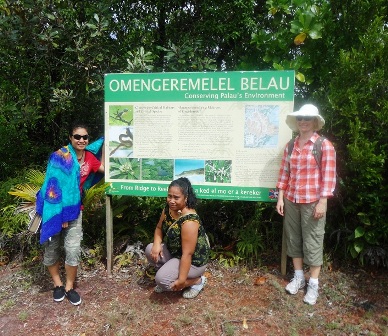 was at the University of the South Pacific.
was at the University of the South Pacific.
Entering the conservation area fascinated me as I realized that there are many endemic plants and Palau is very rich in flora and fauna. I even noticed that some of the trees such as pandanus has more variety in Palau than we have back home in Kiribati.
The lake was beautiful and pristine with all the plants surrounding it but knowing that there are crocodile dwelling in the lake made me a little scared!
Walking along the old Japanese trails and seeing all the sites where there were Japanese plantations was a great opportunity to me as I was able to visit and see the History of Palau during World War 2.
The trip was a long one but at the end of the day I was really grateful and I enjoyed it, we had an excellent tour guide with us which made it really enjoyable, thank you Mr. Kashgar Rengulbau.
Notes:
The 5th Oceania Regional Preparatory Meeting for the 11th Conference of the Contracting Parties to the Convention on Wetlands, hosted in Palau is from 26 to 30 March. The meeting is attended by Australia, Fiji, Kiribati, Marshall Islands, New Caledonia, New Zealand, Palau, Papua New Guinea, Samoa, Tonga, and Vanuatu.
Partners that are attending the meeting are from Japan International Cooperation Agency (JICA) Palau Office, IUCN Oceania Regional Office, Palau Conservation Society, Birdlife International and the Micronesia Challenge Regional Office, among others.
The 5th Oceania Regional Meeting for Ramsar COP11 in Palau is funded by the Governments of Australia and France, with additional support from the UNEP and EU funded Multi-lateral Environment Capacity building project.